We've got the tools for Climate-Smart Agriculture
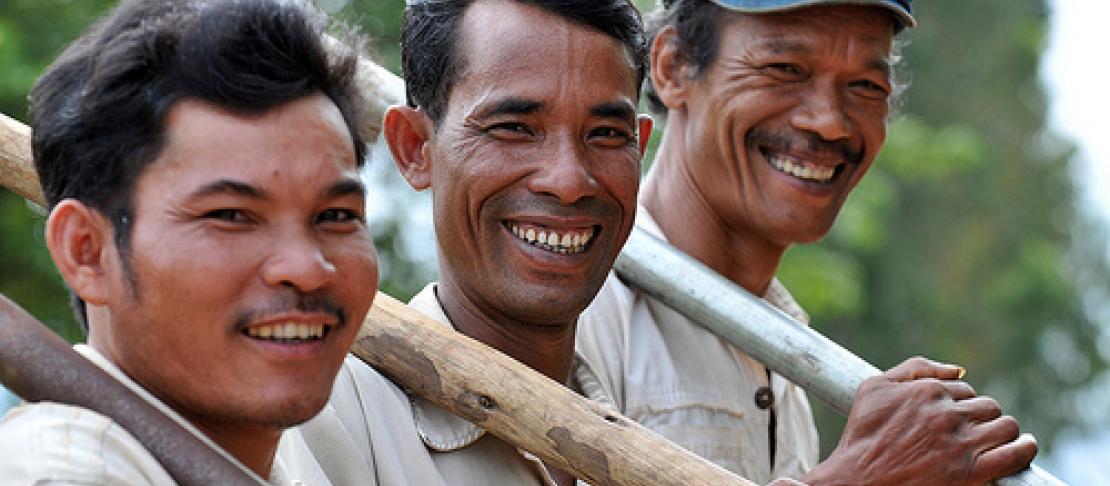
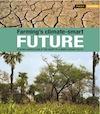 Worldwide, there are opportunities for agriculture to contribute to efforts to adapt to climate change while supporting food security and the fight against poverty, as well as reduce greenhouse gas emissions.
Worldwide, there are opportunities for agriculture to contribute to efforts to adapt to climate change while supporting food security and the fight against poverty, as well as reduce greenhouse gas emissions.
To realise the true potential of climate-smart agriculture, international climate change negotiations must take into these opportunities into account, and adopt policies that create incentives for farmers, help finance projects, and fund continued agricultural research. A new booklet from the Technical Center for Agricultural and Rural Cooperation (CTA) and the CGIAR Research Program on Climate Change, Agriculture and Food Security helps push the agenda forward. Read more: Making the case for climate-smart agriculture – successful cases and a call for action (PDF)
To support a transition to climate-smart agriculture, researchers at the CCAFS program been busy developing a range of tools and options for effective climate adaptation and mitigation in agriculture. These include climate-information tools, an analogues tool, and options for smallholders to truly benefit from international climate finance mechanisms.
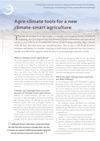 Farmers can adapt their practices to climate change, but they need good information about the conditions in store. Improving the link between climate information and agricultural practices, especially those of smallholder farmers in developing countries is key for adaptation. A new brief by CCAFS theme leader Jim Hansen outlines a number of ‘Agro-climate tools’ that are already being used to fill the gaps between climate information and practical action. Read more: Agro-climate tools for a new climate-smart agriculture (PDF)
Farmers can adapt their practices to climate change, but they need good information about the conditions in store. Improving the link between climate information and agricultural practices, especially those of smallholder farmers in developing countries is key for adaptation. A new brief by CCAFS theme leader Jim Hansen outlines a number of ‘Agro-climate tools’ that are already being used to fill the gaps between climate information and practical action. Read more: Agro-climate tools for a new climate-smart agriculture (PDF)
 A new book co-edited by CCAFS theme leader Eva Wollenberg reviews the state of agricultural climate change mitigation globally, with a focus on identifying the feasibility, opportunities and challenges for achieving mitigation among smallholder farmers. The purpose is ultimately to accelerate efforts towards mitigating land-based climate change. While much attention has been focused on forestry for its reputed cost-effectiveness, the agricultural sector contributes about ten to twelve per cent of emissions and has a large technical and economic potential for reducing greenhouse gases. The book does not dwell on the science of emissions reduction, as this is well covered elsewhere; rather, it focuses on the design and practical implementation of mitigation activities through changing farming systems. Read more: Climate Change Mitigation and Agriculture
A new book co-edited by CCAFS theme leader Eva Wollenberg reviews the state of agricultural climate change mitigation globally, with a focus on identifying the feasibility, opportunities and challenges for achieving mitigation among smallholder farmers. The purpose is ultimately to accelerate efforts towards mitigating land-based climate change. While much attention has been focused on forestry for its reputed cost-effectiveness, the agricultural sector contributes about ten to twelve per cent of emissions and has a large technical and economic potential for reducing greenhouse gases. The book does not dwell on the science of emissions reduction, as this is well covered elsewhere; rather, it focuses on the design and practical implementation of mitigation activities through changing farming systems. Read more: Climate Change Mitigation and Agriculture
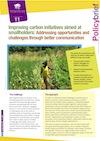 Farmers can also play an important role in reducing emissions and enhancing carbon stocks, if given the right incentives. For agricultural mitigation to be successful, project managers must effectively communicate with small farmers about carbon: what it is, how it can be measured, and the kinds of practices that store and enhance stocks.
Farmers can also play an important role in reducing emissions and enhancing carbon stocks, if given the right incentives. For agricultural mitigation to be successful, project managers must effectively communicate with small farmers about carbon: what it is, how it can be measured, and the kinds of practices that store and enhance stocks.
Read more: Improving carbon initiatives aimed at smallholders: Addressing opportunities and challenges through better communication (PDF) /
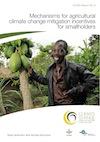 Even though smallholders have important roles to play in preventing greenhouse gas emissions and implementing adaptation strategies, international climate finance mechanisms under the UNFCCC have so far been largely inaccessible to smallholder groups. A new CCAFS report asks how can we ensure that smallholders receive the incentives they need to achieve mitigation. Read more: Mechanisms for agricultural climate change mitigation incentives for smallholders (PDF)
Even though smallholders have important roles to play in preventing greenhouse gas emissions and implementing adaptation strategies, international climate finance mechanisms under the UNFCCC have so far been largely inaccessible to smallholder groups. A new CCAFS report asks how can we ensure that smallholders receive the incentives they need to achieve mitigation. Read more: Mechanisms for agricultural climate change mitigation incentives for smallholders (PDF)
 With climate change posing a threat to food production around the world, scientists are developing a form of virtual time travel that can offer farmers in many countries a glimpse of their future by identifying regions where growing conditions today match those that will exist 20 years from now. New research on Climate Analogues is part of an effort by CCAFS to make climate change adaptation a more tangible endeavor by encouraging the exchange of knowledge between communities around the world regarding current agriculture practices that can help farmers maintain productivity in the future, despite potentially dramatic shifts in growing conditions.
With climate change posing a threat to food production around the world, scientists are developing a form of virtual time travel that can offer farmers in many countries a glimpse of their future by identifying regions where growing conditions today match those that will exist 20 years from now. New research on Climate Analogues is part of an effort by CCAFS to make climate change adaptation a more tangible endeavor by encouraging the exchange of knowledge between communities around the world regarding current agriculture practices that can help farmers maintain productivity in the future, despite potentially dramatic shifts in growing conditions.
Read more: Climate Analogues: Finding Tomorrow’s Agriculture Today (PDF) / Related story: Finding tomorrow's agriculture, today